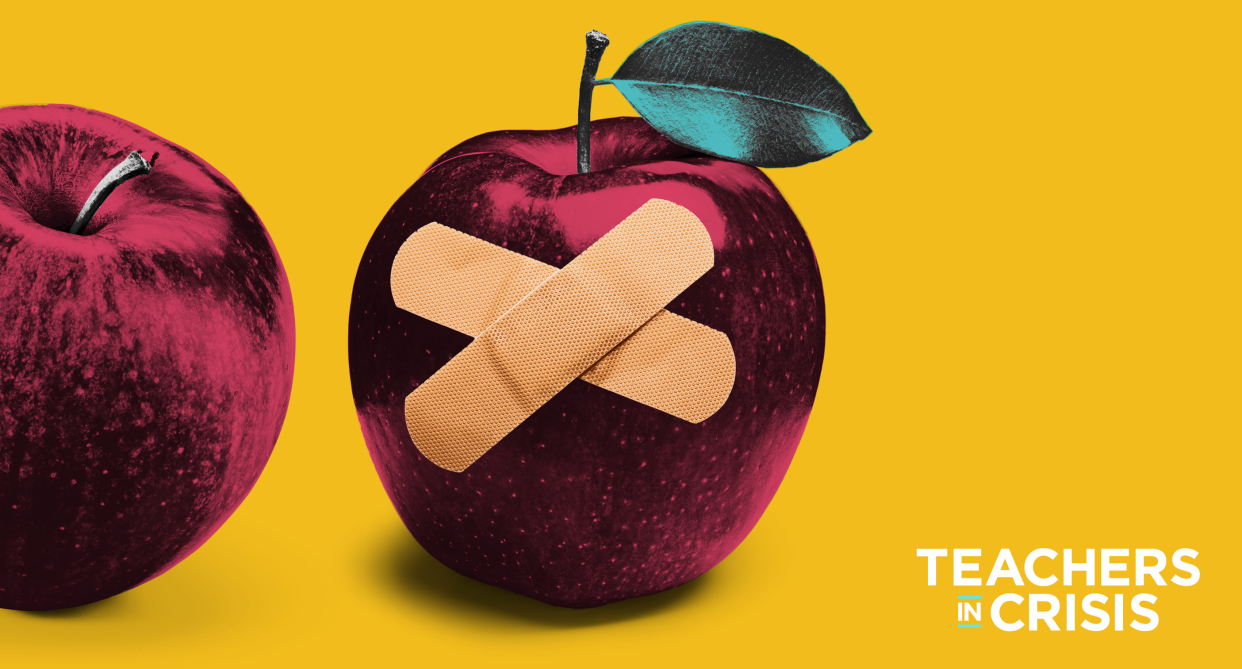'I've never been that sick': Some teachers are so overstressed they're getting physically ill

Amanda Kruysman had just returned from maternity leave when she, her new infant and her 4-year-old son were all hit with the flu. An elementary school teacher in Fort Mill, S.C., Kruysman alerted her principal over the weekend that she’d need a substitute. But rather than giving her strict orders to rest, he demanded she personally deliver her teaching plans to the school.
“Can I just email them?” she asked, to which her principal answered, “It would be a lot better if you could deliver them yourself.”
And so, that Monday at 6:30 a.m., Kruysman — running a temperature of 103 degrees — bundled her similarly feverish kids into the car and went to school, where she dutifully delivered her lesson plans. “I was thinking: Normal jobs don’t make you do this,” she tells Yahoo Lifestyle.
The incident was one of many that convinced Kruysman, 31, to walk away from teaching and take a job in the pharmaceutical industry. But the culture of disregarding teachers’ physical health still upsets her. “I don’t want to be in a position where they’re making me pick between my family and being healthy,” she says. “A lot of times you’re at odds with yourself ... [it’s] a systematic issue that we’re all accustomed to, and a sick norm that we all kind of accept.”

The fact that public school teachers across the nation face high levels of stress is likely not a shocker. But stress is a well-known risk factor for illness, leaving educators doubly vulnerable. An exclusive Yahoo Lifestyle survey of more than 50 former public-school teachers found plenty of anecdotal reports of physical health being compromised by the stressors of teaching.
That’s no surprise, according to a 2016 research brief out of Penn State University. Titled Teacher Stress and Health, the report — written by a group of prevention researchers and psychologists — examined the connection between wellness and the high daily stress levels of educators. Forty-six percent of the teachers surveyed reported “high daily stress,” the highest rate of any occupational group but nurses.
The researchers pointed to multiple studies that show how psychological stress has directly affected teachers’ physical health. In one 2012 study of high school teachers, they noted, 46 percent were diagnosed with excessive daytime sleepiness and 51 percent with poor sleep quality.
A 2018 study out of Michigan State University helped shed light on the mechanism behind this, finding that a certain protein responds to stress by sending signals to immune cells, which can trigger a range of diseases, including asthma, lupus and irritable bowel syndrome (IBS). The latest results (2018) of an annual Stress in America survey, by the American Psychological Association, discuss the many ways stress can affect the body’s various health systems — including gastrointestinal (acid reflux, ulcers, IBS), endocrine (chronic fatigue, diabetes), cardiovascular (stroke, hypertension, heart attack) and even the female reproductive system (irregular periods, PMS, intensified polycystic ovary syndrome).
Former public-school teacher Holly Wilder, of Louisiana, understands this all too well. Within a year of starting teaching, she had four kidney stones removed, appendicitis leading to an appendectomy, shingles, pneumonia and bronchitis. “I’ve never been that sick. I struggle with asthma and I have a bladder disease which flares when I’m stressed,” Wilder tells Yahoo Lifestyle. “Those have been well-controlled at this point, but all those other things are pretty new.”
Physical ailments contributed to another teacher, Malorie Weber of Austin, Texas, leaving her “dream job” as a public school teacher within two years. She recently shared the many heartbreaking reasons why (lack of funding, huge class sizes and more) in a public letter that was covered by Yahoo Lifestyle and the local press.

Now, in an interview with Yahoo Lifestyle, she adds: “I was getting a lot of headaches and my body was sore all the time, my back was in so much pain ... my well-being was so low that I couldn’t be present or attend to things in my personal life at all.” Strict rules about when teachers could and could not take bathroom and lunch breaks broke her down further.
“Really, we’re all supposed to have 30 minutes to eat,” she recalls, “but realistically, that never happens.” That’s because teachers were all required to first walk their students — 35 of them per teacher — to and from lunch, from one building to another, and get them settled.
“Even dismissing our classes five to seven minutes early, which is horrible, couldn’t get us through the process fast enough to leave us time to eat. And then issues would come up.” Students would want to talk with her about problems at home or at school, she says, and it didn’t feel right to rush them away.
On average, she says, “we got about 20 minutes at the most to really sit down and eat. I lost a lot of weight — and not healthy weight, but weight where people were like, ‘Are you eating?’ I wasn’t able to eat the way I want to eat for my body, because you’re rushing ... that leaves you starving by 3 p.m. and eating anything you can eat” — usually, she says, processed junk foods scarfed down in the car.
Bathroom breaks were similarly limited and had to be taken during the three minutes between classes, which often presented challenges. Now Weber does sales for an early childhood education app and says she’s realizing what normal fatigue feels like.
“I’m like, ‘Oh my God, this is what it feels like to be tired at the end of the day but not want to crawl into a dark cave? This is what it’s like to be treated like an adult?’ I get an hour for lunch. I definitely put some healthy weight back on, and my back and my head do not give me the problems they were giving me before,” she says. “My physical and mental health are skyrocketing, which kind of breaks my heart, in a way. I loved my kids. Everybody sort of loses.”
It’s why she calls her new work environment “bittersweet” and says she’s still going through “a grieving process” since leaving the classroom. “Props to the teachers,” Weber adds, “who have made it 30 years.”
If you’re a teacher who wants to share your story, send an email to [email protected]
Read more from Yahoo Lifestyle:
'Things have just gotten so bad': Why teachers in America are leaving the classroom for good
Florida teacher says the profession is no longer sustainable: ‘Who wants to be poor by choice?’
Thousands of teachers help each other purchase school supplies thanks to viral campaign
Follow us on Instagram, Facebook and Twitter for nonstop inspiration delivered fresh to your feed, every day.


